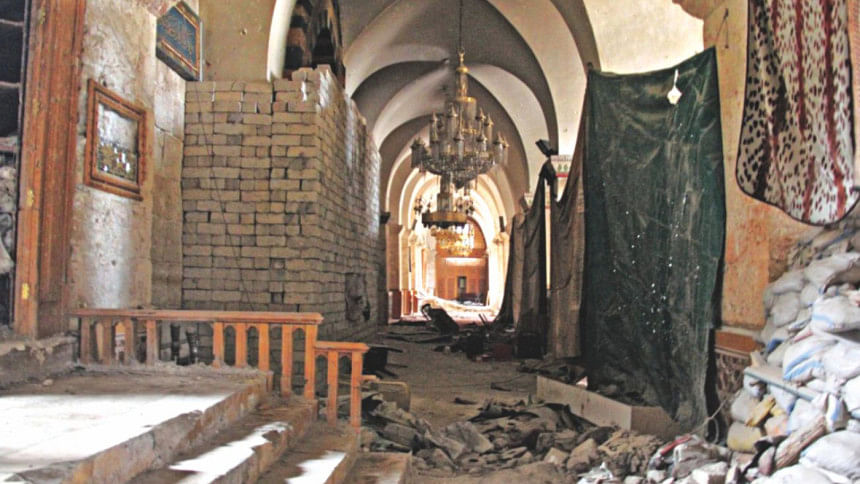Guardians of heritage

This month the famed Afghan historian, Nancy Dupree, died in Kabul at the age of 89, after having dedicated her life to the preservation of Afghan culture. She collected thousands of documents relating to the recent history of Afghanistan from the Soviet invasion in 1979, even though she'd had to leave Kabul for Peshawar and the United States because of the lack of security during the Afghan Taliban rule. Still she persevered, sending documents by horseback through the Khyber Pass to the Afghanistan Centre she established at Kabul University.
Dupree's reason for this painstaking, backbreaking work was her firm belief in the importance of a people knowing its own history. Afghanistan has a rich, diverse past, that includes Greek and Buddhist heritage. She had written a guidebook to the Bamiyan Buddhas in the 1960s, the magnificent statues in central Afghanistan that the Taliban blew up in 2001, in their campaign to efface that heritage. The Taliban's assault on Afghanistan's history made Dupree only more determined to convince the Afghans of its importance.
There are other examples of people risking their lives to preserve culture in conflict zones. Habibullah Ali, an employee of Afghan Film, saved thousands of Afghan film reels from the Taliban in the mid-1990s. The Taliban had decreed all forms of popular entertainment illegal during their rule; Ali and his colleagues hid film canisters in the building behind false ceilings and brick walls so that they wouldn't be destroyed. According to a report in Indiewire, Ali said, "We were very scared but by God's grace we were able to save the movies and now we have this culture alive."
Five workers at the National Museum in Kabul risked death to save some of the priceless treasures from the museum that could have been destroyed or stolen, like thousands of others lost during the years of civil war. An employee of the museum, Shairazuddin Saifi, was in charge of this underground preservation effort; the collection he'd helped save went on display in Perth, Western Australia. Asked by ABC News why he'd done it, he said: "My life was not important, because I accepted the risk. It was our national asset and our history for the new generation that was very important for me."
A story with a sadder ending is that of Syrian archaeologist Khaled al-Asaad, who was beheaded at the age of 82 by the militant Islamic State group in 2015 for refusing to lead them to valuable artefacts and antiquities that had been hidden for safekeeping. His corpse was hung from a Roman column in the central square of Palmyra, an ancient city on the Silk Road, with connections to the Roman and Byzantine empires. Maddened at his non-cooperation, IS killed living history by murdering Al-Asaad, who was an authority on Palmyra's history and a scholar of Aramaic. "Al-Asaad was a treasure for Syria and the world," said his son-in-law, Khalil Hariri.
Economic and technological advances are the visible signs of a nation's march towards progress and modernity, but a nation's cultural and historical heritage reveals the struggles of its people on that path. Preserving that heritage is a way of keeping the past connected to the present and to the future; it is a service to humanity. Nancy Dupree, Habibullah Ali, Khaled al-Asaad and Shairazuddin Saifi recognised the impermanence of their own lives against the larger backdrop of an entire civilisation. They weighed their own insignificance—and all human beings are, in a sense, insignificant—against the rich cultural and historical heritage they would pass down to their children and future generations. And they decided that the reward was worth the risk.
These cultural guardians realised that as well as looting these treasures for their own financial gain, regressive ideologues like the Taliban and IS wanted to rewrite history. As George Orwell said, "Who controls the past controls the future. Who controls the present controls the past." Eliminating entire swathes of history, especially pre-Islamic history, shores up their own authority, making their reign seem eternal and unquestionable. If you pretend that nothing came before you, then you can assert there is no force strong enough to replace you.
In Pakistan, we have a severe lesson to learn from these examples. There are many elements who would like to enact the same damage upon our pre-Islamic history and few cultural guardians willing to risk their lives to save it. More dangerously, our history is deleted from our textbooks, so future generations have no way of learning about it. As the Economist obituary for Nancy Dupree states, "If a people did not know their history, she kept saying, if they did not revere their culture or care for the monuments around them, their nation could not stay alive." It's a warning we would be well-advised to heed.
Bina Shah is a writer and columnist in Karachi. She is the author of the novel Slum Child and A Season for Martyrs.
Copyright: Dawn/Asia News Network





Comments